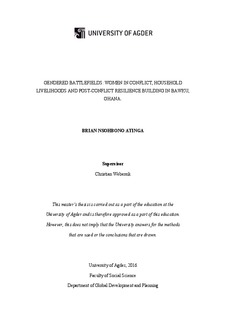| dc.description.abstract | This thesis mainly explores the gendered role of women in conflict and the livelihood implications of ethnic conflict on selected households. The USAID sustainable livelihood framework supplemented by the concepts of agency and empowerment served as the main theoretical points of discussion for this study. Further theoretical insights were drawn from Bujones et al (2013) factor analysis of resilience, in exploring opportunities for resilience building post-conflict in the study area. Using a case study of ethnic conflict between Kusasis and Mamprusis in Bawku (Ghana), responses were analysed to shed light on the perceived battle role of women in conflict, household livelihood and resilience building post-conflict, as well as barriers to women empowerment.
Primarily, the study findings indicate that some women were perceived as active agents in perpetuating ethnic conflict through various acts of rumour mongering, weapon concealment, and spurring their husbands to partake in battle. Although not conclusive, these findings raise questions on earlier narratives that considered women solely as passive victims of conflict. Further, household livelihoods were exacerbated due to the loss of lives, destruction of store of resources, forced migration and displacement, curtailed access to land and micro-credit, and limited mobility due to curfew. In terms of resilience, the study reveals that poor institutional effectiveness and performance, as well as issues related to resource availability and access debilitated post-conflict resilience building efforts. However, networks of social capital and innovative practices were deemed instrumental towards resilience. Finally, the study identified prevailing culture and belief systems, poverty and informal sector work, illiteracy, as well as ignorance and early childhood education as barriers to women empowerment. Based on the findings, the study recommends adopting a gendered approach to conflict resolution efforts; strengthening local institutions; as well as increased capacity building and information flow in addressing ethnic grievances, improving household livelihoods and resilience, and women empowerment post-conflict.
Key words: Ethnic conflict, livelihoods, resilience, empowerment. | nb_NO |

